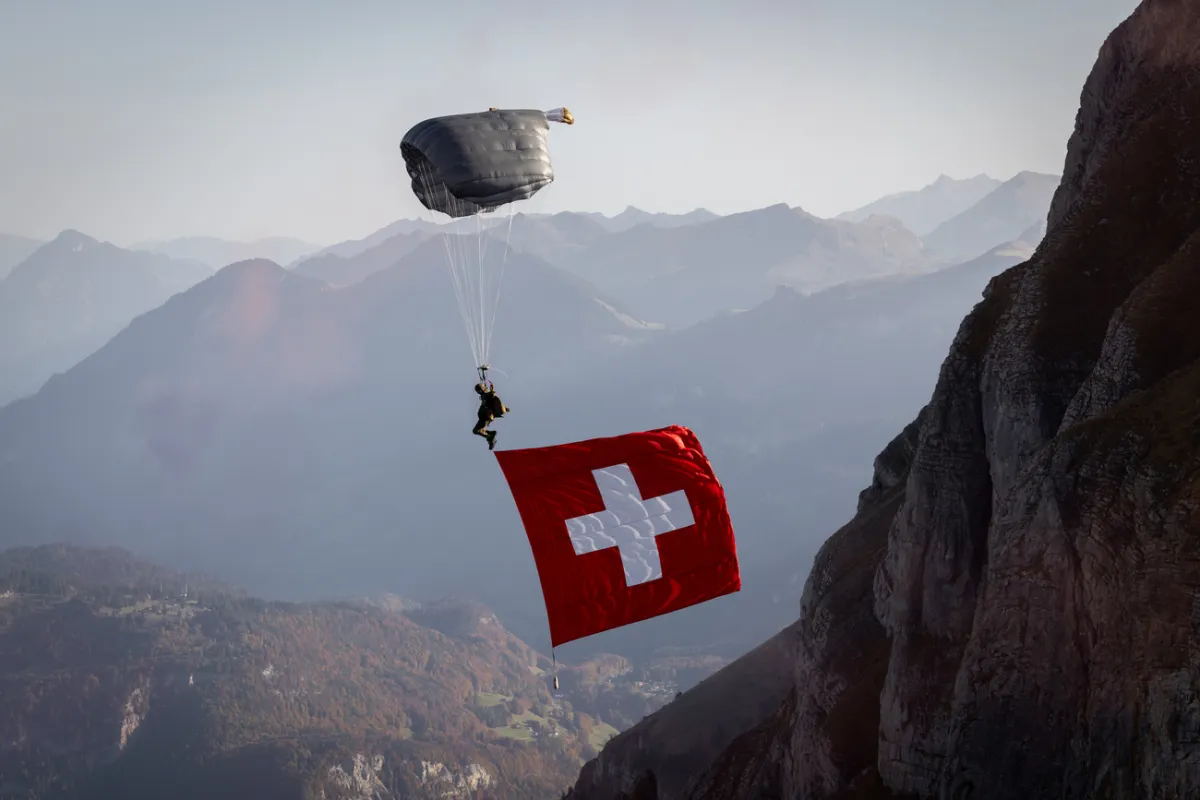
How The Neutrality Initiative Could Affect Swiss Policy
-
Deutsch
de
Was will die ((Neutralitätsinitiative)) an der Schweizer Politik ändern?
Original
Read more: Was will die ((Neutralitätsinitiative)) an der Schweizer Politik än
Français
fr
Que veut changer l'initiative sur la neutralité à la politique suisse?
Read more: Que veut changer l'initiative sur la neutralité à la politique su
Italiano
it
Come l'iniziativa sulla neutralità vuole cambiare la politica svizzera
Read more: Come l'iniziativa sulla neutralità vuole cambiare la politica svi
Español
es
¿Qué pretende cambiar la ((Iniciativa de Neutralidad)) en la política suiza?
Read more: ¿Qué pretende cambiar la ((Iniciativa de Neutralidad)) en la política s
Português
pt
O que a“iniciativa pela neutralidade” quer alterar na política suíça?
Read more: O que a“iniciativa pela neutralidade” quer alterar na política sui
العربية
ar
الحياد السويسري يعود إلى الواجهة: ماذا تقترح المبادرة الشعبية الجديدة؟
Read more: الحياد السويسري يعود إلى الواجهة: ماذا تقترح المبادرة الشعبية الج
中文
zh
中立受质疑,瑞士人将就“中立动议”举行全民投票
Read more: 中立受质疑,瑞士人将就“中立动议”举
Русский
ru
Как ((инициатива о нейтралитете)) изменит внешнюю политику Швейцарии?
Read more: Как ((инициатива о нейтралитете)) изменит внешнюю политику Швейц
In 2026, Swiss citizens will vote on the neutrality initiative. If a majority of both the people and the cantons approve it, Switzerland would writeExternal link“perpetual and armed” neutrality into its constitution.
Currently, the federal constitution states that the federal government and parliament are responsible for neutrality policy. This has allowed Switzerland to adapt its neutrality to the changing geopolitical circumstances over the decades. If the popular initiative is adopted, this flexibility would end.
The neutrality initiative explicitly stipulates that Switzerland would not be allowed to join any military alliance. But this is already prohibited under neutrality law. Joining NATO, for example, as Sweden and Finland did in 2023, ends a country's neutral status. In Switzerland under the current model, such a step would in any case require the approval of both the people and the cantons in a mandatory referendum.
In terms of security policy, the initiative could force Switzerland to scale back its cooperation with NATO, including its participation in the Partnership for PeaceExternal link programme, of which Switzerland has been a part since 1996.
The most far-reaching change would be the ban on“non-military coercive measures”. This means that Switzerland would no longer be able to independently impose sanctions on countries at war, except when decisions of the UN Security Council mandate their implementation.
In 1815, Europe is divided at the Congress of Vienna. This was led by the four victorious powers of Austria, Prussia, Russia and Britain, and later also France. Keystone What defines Swiss neutrality today?
While Swiss neutrality is internationally recognised, it is not required under international law. It is a self-imposed policy, meaning the Swiss can choose to revoke it. It is also armed neutrality, which means the army serves for self-defence. And it applies only to military matters, allowing Switzerland to maintain diplomatic and economic relations with countries at war.
Where does Swiss neutrality come from?Like Austria and Ireland, Switzerland is a permanently neutral country.
Switzerland's neutrality dates back further than any other country in the world. It was first internationally recognised at the Congress of Vienna in 1815, when neighbouring states agreed that Switzerland's“perpetual neutrality” served their mutual interest.
Today, Swiss neutrality policy is based on the Hague Convention, which Switzerland signed in 1910. This cornerstone of international law defines how a neutral state should conduct itself in the event of war between two countries. A neutral state may not participate in any armed conflict and may not favour either of the warring parties through military means. Political statements or economic sanctions, however, are still allowed.
More More Foreign Affairs Explainer: Russia pushes Europe's neutral states closer to NATOThis content was published on Jul 19, 2023 Switzerland wants to cooperate more closely with NATO. Other neutral nations in Europe are also seeking closer ties with the alliance.
Read more: Explainer: Russia pushes Europe's neutral states closer to
Legal Disclaimer:
MENAFN provides the
information “as is” without warranty of any kind. We do not accept
any responsibility or liability for the accuracy, content, images,
videos, licenses, completeness, legality, or reliability of the information
contained in this article. If you have any complaints or copyright
issues related to this article, kindly contact the provider above.


















Comments
No comment